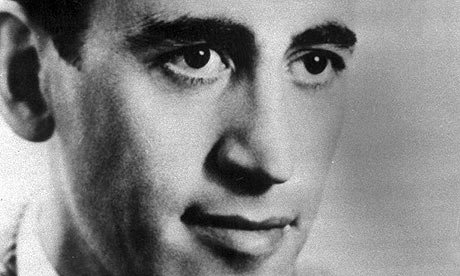
It's JD Salinger's 90th birthday, the party starts at three and the world and his wife are invited. Actually they're not. Instead, Salinger will be spending this anniversary as he is reputed to have spent the last 40 or 50: holed up in Cornish, New Hampshire surrounded by a stack of unpublished manuscripts.
All of which poses a dilemma for those who hold him dear. How does one go about celebrating the life of a writer who – so far as we're concerned – hasn't written since the Civil Rights era? Is it an intrusion to even wish him happy birthday to begin with? Why draw attention to a man who wants for nothing but to be left alone?
Reeling from the success of The Catcher in the Rye, Salinger withdrew from public view in the mid-1950s. He published Franny and Zooey in 1961, a collection of novellas (Raise High the Room Beam, Carpenters and Seymour: An Introduction) in 1963 and then bowed out with a New Yorker short story in 1965. Since then he has spoken only fitfully via his lawyers or been snapped in furious, cowering poses on the roads around his home. And woe betide any of those misguided fans who track him down to explain that they, like, totally love him and can so relate to his retreat from a world of phony bastards. "No you don't," he reportedly told one such visitor. "Or you wouldn't be here."
"What does he mean by that?" asked Metternich on hearing the news that Talleyrand had died. I think that we ask a similar question about JD Salinger. There is an abiding urge to regard his withdrawal as some kind of statement when it was surely intended as just the opposite. So we enshrine his absence as if it's a presence while his actual output slips further into the past. The hideous irony: we may have now reached a point where the hermit in the woods speaks more loudly than the books that he wrote.
And this is surely wrong. Salinger's books still matter; by and large, they still come up fresh. I'd make a possible exception for The Catcher in the Rye, that brilliant adolescent explosion, in that it forged a template which (through no fault of the author) now risks feeling worn from overuse. But check out the gorgeous digression that is Franny or Zooey, or the gleaming epiphanies that make up his Nine Stories. Is there another (living) writer with a better ear for dialogue, a more airy, unobtrusive command of life's little details or such a clear-eyed compassion for his characters? I must have read For Esme – With Love and Squalor about 10 times down the years and yet that ending still knocks me on my back (with "f-a-c-u-l-t-i-e-s" more or less intact).
Who knows why Salinger checked out when he did. Some have found clues in the work itself. They cast the author as a fugitive from his fictional Glass family; a precocious, fragile kid who clamoured to be heard, was duly rewarded, and then found himself unnerved by all the attention. We can't know for sure, and Salinger isn't telling. But this seems as good a guess as any.
Salinger continues to write, apparently. He is rumoured to have produced hundreds of short stories, and perhaps scores of novels over the past however-many decades. The difference is that these are manuscripts written for his own pleasure, with the door closed and with no outside pressure; like a child playing alone in his room.
At least this clears up one dilemma. If a tree falls in the forest then of course it makes a sound. Likewise, if a writer writes books that no one reads then yes, that still makes him a writer. You might go so far as to argue that it is the purest, freest form of writing there is.
So let's whisper our message and then gently leave him be. Happy 90th birthday, Jerome David Salinger. We hope you are healthy, we hope you are writing and we hope that it's good. And fear not: there is no surprise party in the offing. The card's not even in the post.

